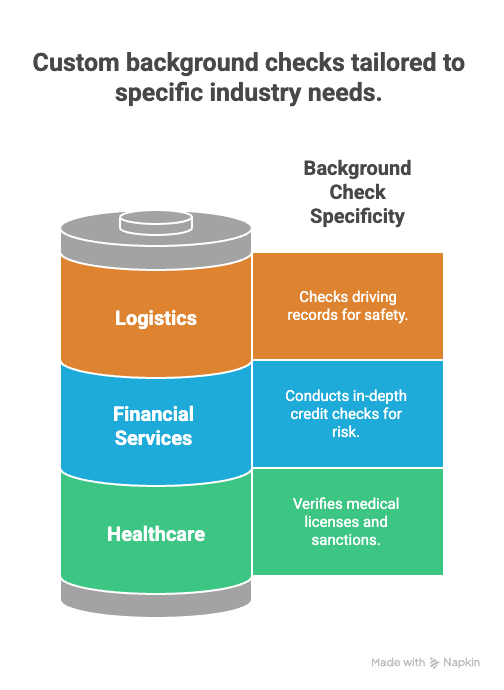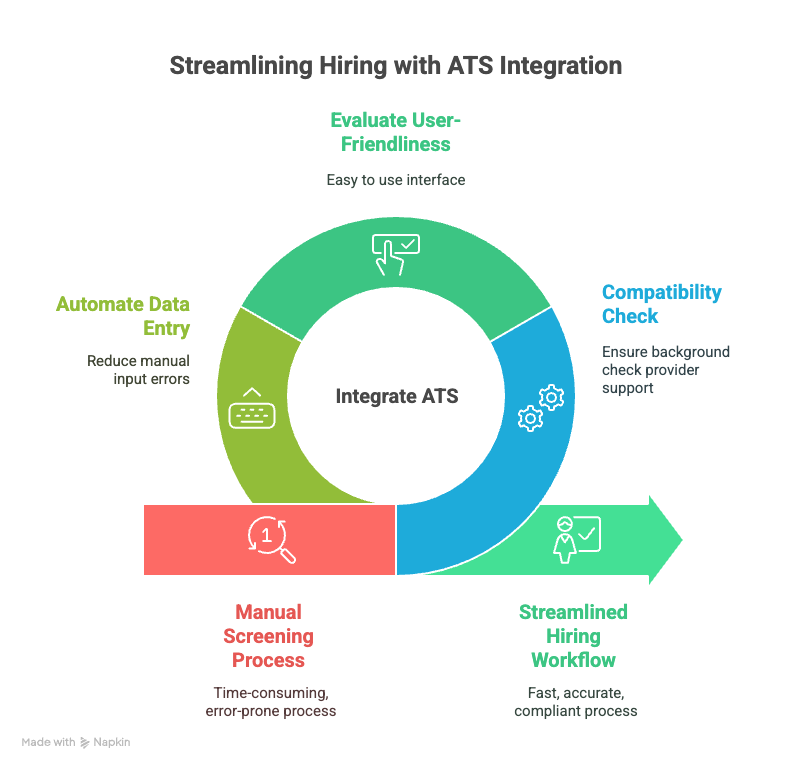Navigating the intricacies of background checks and screening processes can be challenging for businesses striving to make informed hiring decisions. In this guide, we explore the nuances between standard and custom screening packages, empowering you to determine which option aligns best with your organizational needs.
Key Takeaways
- Background screening is essential for mitigating hiring risks and ensuring compliance with industry standards.
- Standard screening packages provide basic checks like criminal history and employment verification, suitable for lower-risk roles.
- Custom packages offer tailored solutions, allowing specific checks for higher-risk positions or industries with stringent regulations.
- Integrating an Applicant Tracking System with your background checks streamlines the hiring process and reduces manual errors.
- Your choice between standard and custom packages should consider your industry's requirements, budget, and the nature of positions you are hiring for.
Introduction
Background screening has become a critical part of hiring today. As companies aim to avoid potential pitfalls, a solid screening process helps mitigate risks and ensures a qualified workforce. But how should your business navigate the choice between standard and custom screening packages?
This decision is more than just a formality; it impacts your company’s compliance, cost, and hiring efficiency. Standard packages are straightforward, often including checks like criminal history and past employment. This might suffice for many roles but can fall short for positions requiring specialized scrutiny.
Custom packages offer more tailored solutions. They allow for checks that reflect the specific demands of your industry or the unique risks associated with certain roles. Whether you are balancing healthcare screening compliance or integrating with an Applicant Tracking System (ATS), each decision shapes your hiring strategy.
This guide will equip you with the insights to choose wisely, considering all these aspects to align your screening strategy with your organizational objectives.
EXPERT INSIGHT: The decision to go with standard or custom background checking is all about protecting individuals and entities. The one-size-fits-all approach rarely works with positions that are sensitive with respect to trust, and customized screenings bring to light only those things that are relevant, and yet do it without unnecessary hurdles. The aim is to achieve a balance between protection and safety and a non-discriminatory hiring process. Screening at its best should help create a workforce based on integrity and trust, and not quaListeners. - Charm Paz, CHRP
Understanding Screening Packages
Background screening packages are essential tools in the hiring toolkit. These packages compile various checks that help you vet candidates effectively. Their purpose is simple: reduce risk by ensuring that potential employees meet the standards and values of your company.
Standard screening packages cover the basics. They typically include criminal background checks, employment history verifications, and sometimes identity verification. These are designed to catch glaring issues like criminal records or falsified work history. They work well for many roles across industries by providing a solid foundation for most hiring decisions.
Choosing between these standard offerings and more tailored solutions involves understanding your specific needs and constraints.
Custom Staffing Background Packages
Complex hiring needs often demand custom solutions. Some industries or roles need detailed background checks that go beyond the basics. Take healthcare; specialized checks like medical licenses and sanction lists are crucial. Financial services might require in-depth credit checks to manage risk.

Custom packages allow you to choose the specific checks relevant to your industry. These might include social media screenings, international criminal checks, or driving records for logistics roles. Each component you add is tailored to your needs, ensuring you're not paying for unnecessary checks.
Customization offers clear benefits. It helps address specific risks, ensuring compliance with industry regulations. For instance, compliance with the Fair Credit Reporting Act (FCRA) is non-negotiable. A tailored package makes sure you cover all legal bases without wasting resources. Moreover, customized solutions can streamline your hiring process. You avoid the one-size-fits-all approach, which saves time and reduces hiring errors.
Consider your industry's demands. Does your company deal with sensitive information? Are you hiring for positions of trust or responsibility? These questions can guide you to a smarter, custom screening strategy.
Factors Influencing the Choice Between Standard and Custom Packages
Choosing between standard and custom background screening packages hinges on several factors. Understanding these will help you make a choice that aligns with your company's requirements.
Industry-Specific Needs: Each industry comes with its unique demands. Take healthcare, for instance. It requires specific screenings that ensure compliance with regulatory standards. A tailor-made package can include checks such as license verification and sanction checks, essential for meeting industry-specific regulations.
Regulatory Requirements: In fields like finance, compliance is a big deal. Regulations such as those from the Financial Industry Regulatory Authority (FINRA) can dictate specific screening practices and influence your selection. Ensuring you meet these standards often means opting for a package that includes in-depth financial checks.
Budget Considerations: Cost is always a factor. Standard packages might be more budget-friendly, offering basic checks that suit generalized hiring needs. However, if your hiring process demands detailed screenings, initial savings on standard packages might lead to higher risks and costs down the line. Weighing the upfront costs against potential long-term benefits is crucial.
Evaluating these factors will guide you in selecting a screening package that not only fits your budget but also meets industry standards and your specific hiring needs.
The Role of ATS Integration for Screening
Streamlining hiring is key to staying competitive. Integrating an Applicant Tracking System (ATS) into your screening process can save time and reduce errors. An ATS manages the workflow, from application to hiring, seamlessly connecting to background checks. This integration ensures accurate and fast results, eliminating the need for manual data entry and reducing the chance of mistakes.
When choosing an ATS, focus on compatibility with your background check provider. Look for systems that support the type of checks you need, whether standard or custom. Evaluate user-friendliness and customer support. A well-chosen ATS simplifies your process and enhances the screening experience.

Imagine a tech company using an ATS to handle high-volume hiring. By integrating background checks, they quickly process candidates, ensuring compliance without sacrificing speed. This setup leads to more informed hiring decisions and a smoother onboarding process, reflecting the importance of efficient ATS integration.
Deciding on the Right Package for Your Business
Choosing between standard and custom screening packages starts with understanding your specific needs. Begin by assessing the nature of roles within your company. Are you hiring for positions with high risk or regulatory demands? If you're in finance or healthcare, custom packages might address unique industry needs.
Next, evaluate the scale of your hiring. If you're regularly onboarding new employees, a custom package could provide better long-term value. Custom packages let you pick the checks that align closely with your risk profile, ensuring compliance where it’s most needed.
Once you’ve outlined your needs, finding the right screening provider is key. Investigate their experience, reputation, and the flexibility they offer. Providers should demonstrate expertise in your industry's regulations and have a solid customer service track record.
Finally, conduct a detailed cost-benefit analysis. While custom packages tend to be pricier initially, they can prevent costly hiring mistakes or compliance issues down the line. Weigh the financial investment against the potential for reduced hire-related risks and improved process efficiency.
Informed by these steps, your choice between standard and custom packages will align with your operational priorities and budgetary constraints.
Conclusion
Balancing the options between standard and custom background screening packages boils down to understanding your company's specific needs. Standard packages provide essential checks like criminal histories and employment verification. They're straightforward and often sufficient for roles with lower risk profiles. But what if your industry navigates more nuanced demands?
Custom packages offer solutions tailored to specific industries or positions. Suppose you're hiring for a position requiring access to sensitive financial data or health records. In such scenarios, standard checks may not cover all necessary bases. A custom package allows for deeper examination, such as credit histories or specific license verifications, ensuring compliance and mitigating unforeseen risks.
The decision between standard and custom should consider industry requirements, regulatory implications, and budget constraints. While custom packages might show higher upfront costs, they often yield long-term savings by reducing turnover and unauthorized exposure. Evaluate your company’s unique landscape, weigh the costs against potential risks, and choose the package that aligns with your strategic hiring objectives.
Informed choices today set the foundation for a robust workforce tomorrow, ensuring you're prepared for the complexities of hiring in the current environment.
Frequently Asked Questions (FAQs)
How much do custom background checks cost for staffing agencies?
Custom background check costs can vary widely, typically ranging from $20 to over $100 per check. Factors influencing the cost include the depth of the check, types of checks included, and the geographic location of the subject or the agency.
What background checks are included in standard staffing packages?
Standard staffing packages usually include criminal history checks, employment verification, education verification, and reference checks. Some packages may also include drug testing or credit history checks.
When should staffing agencies use custom screening packages?
Consider custom screening packages when hiring for specialized positions that require specific checks, like professional licenses verification or more extensive criminal background reviews. Custom packages can also be useful when dealing with sensitive roles where additional scrutiny is necessary.
How to price screening packages profitably?
Determine the costs of each component of the package, including vendor fees and administrative costs. Add a margin that reflects your agency's profit goals. Benchmark your pricing against competitors to ensure competitiveness, and adapt to client needs without sacrificing profitability.
Which screening vendors offer the best customization?
Vendors like Checkr, Sterling, and HireRight are known for offering flexible and customizable screening options. It's important to evaluate vendors based on your specific needs, including speed, accuracy, and customer service.
What factors influence the cost of a background check?
The cost is influenced by the types of checks conducted, the geographic areas involved, the depth of the information required, and the provider chosen. Volume discounts may also be available from some vendors.
How can I ensure compliance with legal requirements during background checks?
Familiarize yourself with federal, state, and local laws about background checks. Ensure that you have the candidate's consent and that the checks performed are relevant and necessary for the job.
How fast can background checks be completed?
Standard background checks may take anywhere from 1 to 5 business days. More complex checks, like international searches or detailed criminal histories, may take longer.
What are some best practices for communicating background check results with candidates?
Be transparent throughout the process. If a check results in adverse action, inform the candidate promptly and allow them an opportunity to dispute any inaccuracies.
How can I measure the effectiveness of my background screening process?
Track metrics such as the time to complete each check, the accuracy of the results, the rate of disputes, and the overall satisfaction of both hiring managers and candidates. Regularly review these metrics and adjust your process accordingly.

GCheck Editorial Team
Meet the GCheck Editorial Team, your trusted source for insightful and up-to-date information in the world of employment background checks. Committed to delivering the latest trends, best practices, and industry insights, our team is dedicated to keeping you informed.
With a passion for ensuring accuracy, compliance, and efficiency in background screening, we are your go-to experts in the field. Stay tuned for our comprehensive articles, guides, and analysis, designed to empower businesses and individuals with the knowledge they need to make informed decisions.
At GCheck, we're here to guide you through the complexities of background checks, every step of the way.






